McBride’s
categories: Cocktail Hour
8 comments
After the Kachemak Bay Writers Conference (about which more soon—I want to start a conversation about writers conferences and tell you more about what made this one so good), eight participants took part in a post-conference workshop, led by yours truly, to take place at the Kachemak Bay Wilderness Lodge, off across the bay. With Rich Chiappone’s help, I mailed home about twenty pounds of beach pebbles and books and dress clothes (including my shiny shoes). Later, Carol Swartz, the conference director, let me leave my still unbelievably enormous suitcase in her car and dropped me with my rucksack and binoculars at ramp 2, a steep steel descent to the boat slips and the water taxi.
One by one by two by three the workshoppers appeared, then a young woman who turned out to be the lodge’s babysitter—the owners had grandchildren. Her dad saw her off and only showed his sorrow at their parting (which presaged more and deeper partings to come) when her back was turned. We workshoppers focused on the young woman so as not to focus on our shyness, all these strangers. She was planning to be a brain surgeon, she told us, soon to leave for a medical camp in San Diego. Medical camp! When I was her age I was sailing Sunfish in Long Island Sound without a thought in my head but Linda, and maybe Jimi Hendrix. Everyone seemed tired as I—the conference had been exhausting. In a good way.
No more than a half-hour and we were pulling into China Poot cove, and then under a very high dock, and soon cheerful people were clambering down a long wooden ramp to greet us, hands reaching for us as the taxi captain kept his bow pointed in. A kindly woman in a short haircut announced that she had blue mussels ready, blue mussels cooked on alder wood, and I wished they were for us. Then it turned out that they were for us. This was Diane McBride, who has built the lodge over 40 or more years with her husband, who was nowhere in sight. Inside the main building we shuffled around and ate more mussels and other snacks and tried to orient ourselves. Shannon McBride served up tea. I asked for a glass of wine and and I ate mussels and tried to think what I’d say at the evening—but that would be after dinner. Outside, rows of boots in all sizes for tidepooling, huge map of Alaska. A rack of tide-washed oars and broken gaffs and orphaned chair legs and every odd sort of handle turned out to be sculpture. A spring had been directed craftily into a wooden trough, which dripped, mossy and cold. My room was a little cabin at the top of a glade, view of the cove and tide and mountains across the way.
“What time shall I serve dinner?” Diane said.
I seemed to be in charge.
You just say a time.
#
Michael McBride turned up for dinner, having just flown down from their remote lake camp in his floatplane, dropping employees up there—the guest season was starting and everything needed to be prepared and opened up. I only slowly became aware that the family had donated our stay there, that I couldn’t afford this place, not in real life. The lodge chef, just in from Vienna, made red salmon (this is a species, not only a color), fish caught that afternoon, crusted in nettles from the edges of the woods around us, lovely, succulent.
Michael McBride is older than I, put it that way, and in much better shape, and voluble, speaking in French at times and leaping into song, full of conversation, including everyone in every query, slapping shoulders, pulling people to him fearlessly. Diane is quieter, a little serious as the food came out—would we like it? Would we need anything?
The group met in the solarium, a building high over the cove with woodstove and living-room furniture, huge windows, lovely deck. It was evening, of course, but the sun was still high. Diane joined us, then Shannon, then Michael. They’d be part of the group, a lot of wonderful experience among them, and really good sentences. My idea for our two days was to work on starts. I’d give some exercises to get everyone writing, and hope to send everyone home with enough material to work on for a year or two. My first assignment for them was to write about our arrival in any fashion they wished, making sure to include an object, a person, and something happening.
A sea otter played down in the cove, then fell asleep with his paws on his chest, floating. Something was thrashing the water across the way. “Seals,” Michael said. “They don’t have paws to hold their fish down, so they bash it on the water to break it up.”
A mist floated in.
The evening light didn’t change, or only incrementally—summer solstice soon.
I took a short walk to the cliff over the sea otter, watched him a long time through my binocs. He seemed to be snoring. The cliff was covered in flowering plants, yellow and purple and white, all hanging and bright in the night sun. Lia was coming out of the sauna when I stepped back down into the yard—“Your turn,” she said.
Michael had told us about the building—it was one of the original settler cabins. He’d dragged it by boat into the ocean on the other side of his land and towed it around to the lodge where it remained. Blazingly dry in there. Complete supply of shampoos and lotions and soaps. Mix cold water from a spout with hot water from a sheet-metal box on the fire. Pour over head. Soap up. Water over head. Repeat. Repeat. Repeat.
#
Next morning another walk, this time across the point of land to the bay behind, more of the endless wildness and plain beauty. Diane spotted me and asked if I wanted a dog along, and so I wasn’t alone, black lab whose name escapes me—help me someone with its name!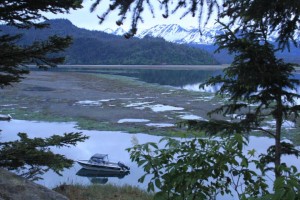
Gorgeous breakfast, of course, fruit and breads and salsa with eggs.
At group, everyone had written beautifully about our arrival, and everyone read to us. Fun to hear the view from the other side—what Diane and Michael and Shannon had thought as we arrived, these expert hosts, still taking pleasure in all of it.
#
Michael took me back to their house, a walk through the woods past the foundation holes of ancient dwellings, past midden humps undisturbed. He took a lot of delight in my delight in the place, which was a builder’s delight, windows aimed at solstice sunsets, shelves of ancient stone tools found among the beach rocks, a spring directed from outside along a fanciful riverbed made of rocks, a little stream that flowed down the face of his chimney and along the floor and through the wall somehow and out across the yard outside. Photo on the fridge of their son washing a leper’s feet in India. Behind a paper door a meditation room facing first snow, as Michael explained. He sat me down in there and played me a song he’d told me about—a gift for me, this song, all in French. He translated the bits I couldn’t get, sang along a little. I don’t even want to say the name of the singer, the name of the song, but keep the gift of it to myself.
Later, I’ll tell you.
#
Matty and the children and Janice (from Homer) and Peggy (from Phoenix) and I worked our way through a record low tide, blinnies and octopi and crabs and starfish in two designs—the familiar one and one shaped like, I don’t know, an explosion. Matty the babysitter told stories of tourists caught out in the mud, legs pulled off by helicopters, people who said no to amputations and died despite scuba gear and broken-hearted honeymooners. Future doctor, she took some delight in the details.
#
In our group two husbands had died, one only months before: Dawn’s. One of our people, Jan, had survived a massive brain hemorrhage and operations, owned a lodge over in Halibut Cove, huge sense of humor, taking a year off to heal. Sue had come along with her husband to see that he wrote his incredible story—she didn’t have a writer bone in her body, so she said, but of course she wrote beautifully. Her husband, Larry, was very damn good at telling this story of his, an incredible tale of a life in world travel, no home base. I offered what advice I could, tried to keep it serious and true: this is what’s needed. The McBrides, they had wonderful stories to tell.
#
Michael went off in his float plane and came back with Libby Roderick and Larry Merculieff. So two Larrys. Libby is well known in Alaska and around the world as a singer/songwriter. Larry’s an Aleut activist and a great storyteller. His prayer at dinner moved me like I haven’t been moved by anything spiritual in many years, just an invocation of the interconnectedness of everything.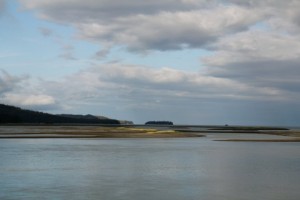 Much of the talk at dinner was about BP, the gulf of Mexico, its relationship to oil exploration in Alaska. Then Diane asked us to talk about ourselves, one by one around the circle—an inn owner’s gesture, of course. Everyone interesting, too. Larry Merculieff said bluntly that he’d grown up in slavery, forced to work by the U.S. government.
Much of the talk at dinner was about BP, the gulf of Mexico, its relationship to oil exploration in Alaska. Then Diane asked us to talk about ourselves, one by one around the circle—an inn owner’s gesture, of course. Everyone interesting, too. Larry Merculieff said bluntly that he’d grown up in slavery, forced to work by the U.S. government.
#
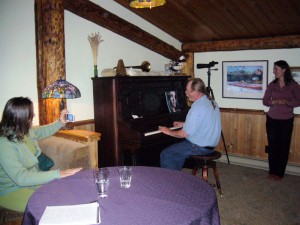 We had a party later in the solarium, wine and cheese, a little whiskey. Libby sang—very moving. Michael McBride sang an Irish song, ditto. Larry told more stories, one about how he’d escaped being circumcised at age 13 by an overzealous government doctor. I played polka on the old piano, and everyone danced behind me, wow.
We had a party later in the solarium, wine and cheese, a little whiskey. Libby sang—very moving. Michael McBride sang an Irish song, ditto. Larry told more stories, one about how he’d escaped being circumcised at age 13 by an overzealous government doctor. I played polka on the old piano, and everyone danced behind me, wow.
#
My last assignment to everyone was to start writing the book they’d write if they had all the time and talent in the world.

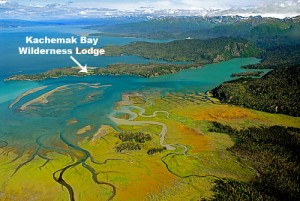
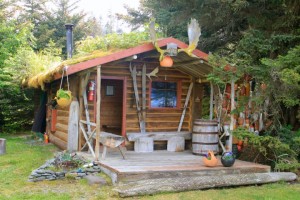

Sounds like paradise! Everyone has a story to tell if you’ll stop long enough to listen for it…
Homer is a great place, but everything is better across the bay. The food tastes better. The flowers smell sweeter. My kids don’t even fight when we’re over there. I’m glad you got to experience a little of the good life on the south side of Kachemak Bay.
Oh my – it sounds wonderful… I would have liked to have been there!
Looking forward to your conversation about what makes a writers’ conference good…
Thanks!,
Dori
Sounds like my kind of place and people. Thanks for sharing this, Bill.
I’ve attended a couple writers’ conferences, big ones, cattle-call-like large affairs that were open to the public and freely accessible. The public seminars and readings and discussions were pointed and insightful, some in unintended ways opened my eyes to qualities of storycraft I’d overlooked. My agoraphobia anxiety level was challenged. A few tactical adjustments and imaginary barrier building made them survivable. Only slight dissociative episodes.
I can’t afford the quaint, private ones that would more suit my needs and comfort zone. I’m jealous. C’est la vie. A poet’s journey ultimately is a private one.
a lot of great writers conferences have scholarships, internships, all kinds of ships… and a lot are free are or offer free admission to readings, lectures, etc… the Kachemak conference is heavily subsidized in various ways… and the post-conference wasn’t expensive at all, not for the value… put away ten bucks a week for a year and you’re there!
I’m a writing conference window shopper. Even travel expenses a few hours away I can’t afford. I’m lucky to pay down ten bucks a week on a mountain of education and medical debts. They wrote this platitude about me: I can’t even afford to pay attenton. But since paying attention is actually free, it’s about all I do besides writing and daily living activities. Paying attention is about the only all-expenses-prepaid vacations I take.
I’ve considered organizing one hereabouts where the destination is so attractive just being there would be worth the low conference cost and whatever travel expenses, primitive accommodations, room and board of about thirty bucks a day. But it would be at the edge of the known universe travel-wise. If Moses cant’ go to the mountain, bring the mountain to Moses.
I’m comtemplating trying starting a free, small, private online writing conference that would suit my circumstances. Private writing excerpt circulation and commentary, writing topic seminars, writing struggle colloquy give and take. Sure, there’s already a plentitude of online writing venues. I want to taylor one to my needs so all the routine, digressive roughhousing crap doesn’t harsh my mellow. I’ve discussed it with writers having similar needs. No takers yet. Just naysayers.
Where there’s a wll there’s a way.
Thanks for the invite! Looking forward to reading more – hope to see you again and share stories.